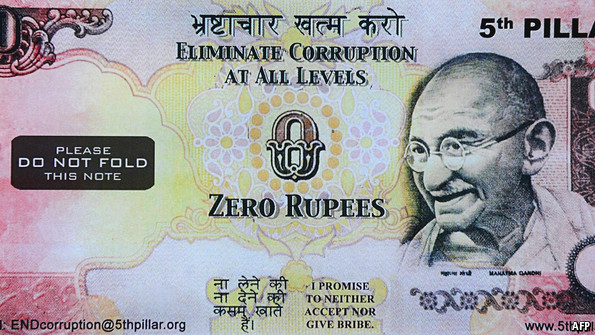Beating bribery
Small change
http://www.economist.com/news/international/21591198-increasingly-popular-weapon-fight-against-corruption-fake-money-small-change?fsrc=scn/fb/wl/pe/smallchange
An increasingly popular weapon in the fight against corruption: fake money

WORTHLESS currency is not necessarily useless. It can be a pointed way of shaming someone who asks for a bribe. That is the thinking behind zero-rupee notes, an Indian anti-corruption gimmick now attracting worldwide interest. They look roughly like 50-rupee ($0.80) notes; people are encouraged to hand them to corrupt officials, signalling resistance to sleaze.
Vijay Anand, founder of 5th Pillar, an anti-bribery campaign that launched the notes, calls them a “non-violent weapon of non co-operation”. His group has distributed more than 2.5m since 2007. The idea is catching on: campaigners from Argentina, Nepal, Mexico and Benin have been in touch asking for details. Malaysia is mulling a similar project. And a worthless note will be launched in Yemen next year.
Yemen is usually reckoned to be one of the world’s most corrupt countries. But Mariam Adnan, an activist there, says a new generation may be amenable to change. Her group is handing out 5,000 “honest riyals” in schools and universities. “You have to change minds before you can change laws,” she says.
Such campaigns might be risky in countries where bribes are extorted at gunpoint. But in places where public opinion is already shifting, they could be a useful way of making bureaucrats behave better. Shaazka Beyerle, an expert on civil resistance campaigns, says that using the zero-rupee note offers protection. It shows a person’s affiliation with a larger movement which cannot be brushed aside by one angry official.
